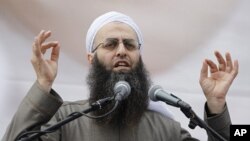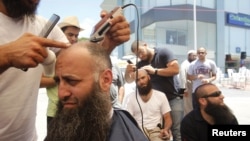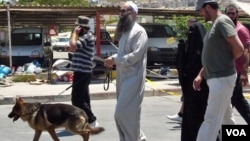SIDON, Lebanon -- Under the blistering summer sun in the coastal city of Sidon, a new protest camp is highlighting a deepening sectarian divide in Lebanon. Led by a previously obscure Salafi preacher, the stated goal of the sit-in is to bring the Shiite militant group Hezbollah's vast, independent arsenal of weapons under the control of the government.
The rapid ascent of Sheikh Ahmad Assir, the charismatic 44-year-old Sunni cleric who called for the sit-in, is raising concern among Lebanese that the country's fragile sectarian balance is unraveling – an alarming prospect in a country which has yet to fully recover from a bloody, 15-year civil war.
Assir's vitriol is directed squarely at Hezbollah and one of the group's primary patrons, the regime of Syrian President Bashar al-Assad. Lebanon's long history of political assassinations, especially of critics of the Syrian government, looms large in the minds of the sheikh's supporters.
The ongoing war in neighboring Syria has enraged a Sunni populace that finds itself increasingly at odds with the Lebanese government, which is dominated by a Hezbollah-led pro-Assad regime coalition. After Assir directed threatening remarks at Hezbollah Secretary General Hassan Nasrallah in a television interview last month, the station was attacked with Molotov cocktails, and streets across Beirut were blocked with burning tires. Two months of sectarian fighting linked to Syria in Lebanon's northern city of Tripoli claimed the lives of at least 30 people and left some 200 injured this spring. And fighting in Beirut between pro- and anti-Syrian regime Sunni political parties killed several people in May.
The “Sunni Lion”
Some in the camp refer to Sheikh Assir as the "Sunni Lion." Local newspaper Al-Akhbar has called him "the face of a new phase of Salafi activity." And though it is modest in size, attracting several hundred people at most, Assir's open-ended street protest has become something few people can ignore. Lebanon's president and interior minister have so far failed to mediate a solution.
On a four-lane thoroughfare wedged between a car dealership and a plant nursery, the protest camp is small but growing. "Here is the border," Walid Hamimi, a tannery owner and volunteer bodyguard for Assir says with a laugh, gesturing to a parked dump truck blocking the road. New mattresses and tents are brought in throughout the day to accommodate a growing number of protesters. The camp is encircled with a make-shift security force – muscular young men in polo shirts idle on plastic chairs – and arriving visitors' identities are radioed in to the camp's communications hub. "We welcome anyone who wants to join us: Sunni, Shia, Christian, Druze… anyone," Hamimi says.
Assir speaks to a disgruntled populace that has felt marginalized since Hezbollah took over Beirut from Sunni political parties by force in May 2008. For Assir, the events were a turning point, which he says forever changed his views on "the Resistance," as Hezbollah is commonly called in Lebanon. "We cannot take this any longer," Assir says, stroking his pet German shepherd in the shade of a used car lot next to the sit-in area. "Hezbollah's aggressive stance against the Lebanese people is unacceptable. The situation has become completely unbearable," Assir adds. One word that comes up in almost every conversation in the camp is dignity, and everyone here laments the perceived loss of it.
Broad appeal
Assir's message resonates not only within the masses, but also among some of the well-off and educated. Mohammed Kawam, a Ph.D. candidate in nanotechnology, has taken a leave of absence from his job and studies to stay in the camp. "Since 2006, Hezbollah's weapons have been moved to Beirut, and pointed at [the] Lebanese," he says, referring to the last war with Israel. "If they are truly the resistance, why are they oppressing [the] Lebanese? They should point their weapons at Israel, not us." Kawam says he will stay here for as long as the sheikh asks him to.
Since the collapse of then prime minister Saad Hariri's government in 2011, a political void has been left unfilled. "The seat of Sunni leadership has been empty for a long time," Hamim, the bodyguard, says. "Hariri sits in France while we suffer constant humiliation under Hezbollah. His words mean nothing to us and our sheikh understands this very well."
Regardless of what some of his followers might wish, Assir claims he has "never had any interest in politics." And with no clear political leadership, many Sunnis feel abandoned by their former patrons.
The son of a professional singer, Assir says his childhood was shaped largely by the Lebanese civil war and, at age 15, he fully embraced Islam. In 1997, he built the Bilal bin Rabah mosque in Sidon, where he serves today as its imam. His brand of Salafism adheres to a puritanical interpretation of the Quran.
The Syria factor
Primary among the concerns of Assir's congregation is the worsening conflict in Syria. From the Bilal bin Rabah mosque, the sheikh followers even run a charity for Syrians.
"We offer our revolutionary brothers in Syria moral support as Muslims and as human beings, but we do not give them weapons as Hezbollah has claimed. However, Hezbollah sends fighters to help Assad and they kidnap Syrian revolutionaries here on [Assad's] behalf," Assir says, echoing claims long made by some members of the opposition in Syria. "How can Hezbollah claim to defend the dignity of all Muslims when they support the murderer Assad?"
As spokesman for Hezbollah's political wing declined to comment, but the group's allies have repeatedly lashed out at Assir, claiming he sends weapons and fighters into Syria.
Sheikh Assir says his goal is "to break the Lebanese people's fear of the Syrian regime."
Assir's camp is well equipped for a long stay and with new facilities such as toilets, running water, wireless internet, and flat screen televisions. His detractors are sure that the sheikh receives foreign funding, most likely from Saudi Arabia. But Assir disputes this, and claims to have rebuffed attempts at contact by the embassies of Saudi Arabia and Kuwait who, he says, are "trying to buy our cause." He says all monetary support comes only from ordinary people in Lebanon, Syria, Jordan and the Gulf.
Downplaying Assir
Many Lebanese are unimpressed with Assir's tactics. An elderly shop owner in downtown Sidon named Khalil says, "Ahmad Assir is a good man, a holy man, but he does not have much support here. He is only hurting businessmen like me with this ridiculous protest." However, a counter-protest by area business owners last week failed to convince Assir to leave. A violent breakup of the camp has so far been avoided, but cannot be ruled out altogether.
While there clearly is momentum building around Assir, he still has far more skeptics than believers. Kamal Wazne, a Beirut-based political analyst says Assir is merely a "hiccup" on the political scene, but stresses that “his sectarian agenda carries great risk in Lebanon.” “This is something that can easily spread here. The main problem [in Lebanon today] is the failure of the government to deal with the security issues in the north," Wazne says, pointing to the recent sectarian violence in Tripoli. He adds that the continued inability of the security forces to control the situation will become a "catastrophic" problem for the state. The Lebanese army recently scrapped plans to disperse the camp with water cannons over fears of political backlash.
Wazne also points to the harm done by disrupting people's daily lives with a sit-in, which some feel could hurt the cleric's chances of growing his support base. "The people of south Lebanon will not rally behind Sheikh Assir as he might want to believe," Wazne says. "Not now, or in the future."
The rapid ascent of Sheikh Ahmad Assir, the charismatic 44-year-old Sunni cleric who called for the sit-in, is raising concern among Lebanese that the country's fragile sectarian balance is unraveling – an alarming prospect in a country which has yet to fully recover from a bloody, 15-year civil war.
Assir's vitriol is directed squarely at Hezbollah and one of the group's primary patrons, the regime of Syrian President Bashar al-Assad. Lebanon's long history of political assassinations, especially of critics of the Syrian government, looms large in the minds of the sheikh's supporters.
The ongoing war in neighboring Syria has enraged a Sunni populace that finds itself increasingly at odds with the Lebanese government, which is dominated by a Hezbollah-led pro-Assad regime coalition. After Assir directed threatening remarks at Hezbollah Secretary General Hassan Nasrallah in a television interview last month, the station was attacked with Molotov cocktails, and streets across Beirut were blocked with burning tires. Two months of sectarian fighting linked to Syria in Lebanon's northern city of Tripoli claimed the lives of at least 30 people and left some 200 injured this spring. And fighting in Beirut between pro- and anti-Syrian regime Sunni political parties killed several people in May.
The “Sunni Lion”
Some in the camp refer to Sheikh Assir as the "Sunni Lion." Local newspaper Al-Akhbar has called him "the face of a new phase of Salafi activity." And though it is modest in size, attracting several hundred people at most, Assir's open-ended street protest has become something few people can ignore. Lebanon's president and interior minister have so far failed to mediate a solution.
On a four-lane thoroughfare wedged between a car dealership and a plant nursery, the protest camp is small but growing. "Here is the border," Walid Hamimi, a tannery owner and volunteer bodyguard for Assir says with a laugh, gesturing to a parked dump truck blocking the road. New mattresses and tents are brought in throughout the day to accommodate a growing number of protesters. The camp is encircled with a make-shift security force – muscular young men in polo shirts idle on plastic chairs – and arriving visitors' identities are radioed in to the camp's communications hub. "We welcome anyone who wants to join us: Sunni, Shia, Christian, Druze… anyone," Hamimi says.
Assir speaks to a disgruntled populace that has felt marginalized since Hezbollah took over Beirut from Sunni political parties by force in May 2008. For Assir, the events were a turning point, which he says forever changed his views on "the Resistance," as Hezbollah is commonly called in Lebanon. "We cannot take this any longer," Assir says, stroking his pet German shepherd in the shade of a used car lot next to the sit-in area. "Hezbollah's aggressive stance against the Lebanese people is unacceptable. The situation has become completely unbearable," Assir adds. One word that comes up in almost every conversation in the camp is dignity, and everyone here laments the perceived loss of it.
Broad appeal
Assir's message resonates not only within the masses, but also among some of the well-off and educated. Mohammed Kawam, a Ph.D. candidate in nanotechnology, has taken a leave of absence from his job and studies to stay in the camp. "Since 2006, Hezbollah's weapons have been moved to Beirut, and pointed at [the] Lebanese," he says, referring to the last war with Israel. "If they are truly the resistance, why are they oppressing [the] Lebanese? They should point their weapons at Israel, not us." Kawam says he will stay here for as long as the sheikh asks him to.
Since the collapse of then prime minister Saad Hariri's government in 2011, a political void has been left unfilled. "The seat of Sunni leadership has been empty for a long time," Hamim, the bodyguard, says. "Hariri sits in France while we suffer constant humiliation under Hezbollah. His words mean nothing to us and our sheikh understands this very well."
Regardless of what some of his followers might wish, Assir claims he has "never had any interest in politics." And with no clear political leadership, many Sunnis feel abandoned by their former patrons.
The son of a professional singer, Assir says his childhood was shaped largely by the Lebanese civil war and, at age 15, he fully embraced Islam. In 1997, he built the Bilal bin Rabah mosque in Sidon, where he serves today as its imam. His brand of Salafism adheres to a puritanical interpretation of the Quran.
The Syria factor
Primary among the concerns of Assir's congregation is the worsening conflict in Syria. From the Bilal bin Rabah mosque, the sheikh followers even run a charity for Syrians.
"We offer our revolutionary brothers in Syria moral support as Muslims and as human beings, but we do not give them weapons as Hezbollah has claimed. However, Hezbollah sends fighters to help Assad and they kidnap Syrian revolutionaries here on [Assad's] behalf," Assir says, echoing claims long made by some members of the opposition in Syria. "How can Hezbollah claim to defend the dignity of all Muslims when they support the murderer Assad?"
As spokesman for Hezbollah's political wing declined to comment, but the group's allies have repeatedly lashed out at Assir, claiming he sends weapons and fighters into Syria.
Sheikh Assir says his goal is "to break the Lebanese people's fear of the Syrian regime."
Assir's camp is well equipped for a long stay and with new facilities such as toilets, running water, wireless internet, and flat screen televisions. His detractors are sure that the sheikh receives foreign funding, most likely from Saudi Arabia. But Assir disputes this, and claims to have rebuffed attempts at contact by the embassies of Saudi Arabia and Kuwait who, he says, are "trying to buy our cause." He says all monetary support comes only from ordinary people in Lebanon, Syria, Jordan and the Gulf.
Downplaying Assir
Many Lebanese are unimpressed with Assir's tactics. An elderly shop owner in downtown Sidon named Khalil says, "Ahmad Assir is a good man, a holy man, but he does not have much support here. He is only hurting businessmen like me with this ridiculous protest." However, a counter-protest by area business owners last week failed to convince Assir to leave. A violent breakup of the camp has so far been avoided, but cannot be ruled out altogether.
While there clearly is momentum building around Assir, he still has far more skeptics than believers. Kamal Wazne, a Beirut-based political analyst says Assir is merely a "hiccup" on the political scene, but stresses that “his sectarian agenda carries great risk in Lebanon.” “This is something that can easily spread here. The main problem [in Lebanon today] is the failure of the government to deal with the security issues in the north," Wazne says, pointing to the recent sectarian violence in Tripoli. He adds that the continued inability of the security forces to control the situation will become a "catastrophic" problem for the state. The Lebanese army recently scrapped plans to disperse the camp with water cannons over fears of political backlash.
Wazne also points to the harm done by disrupting people's daily lives with a sit-in, which some feel could hurt the cleric's chances of growing his support base. "The people of south Lebanon will not rally behind Sheikh Assir as he might want to believe," Wazne says. "Not now, or in the future."






